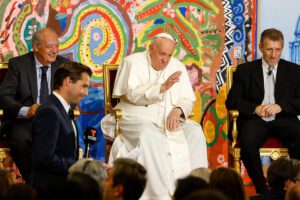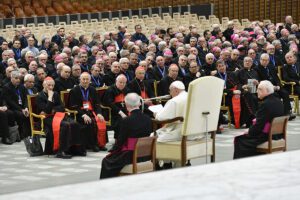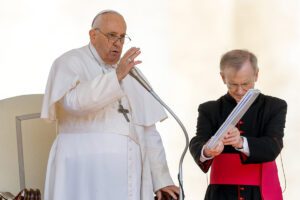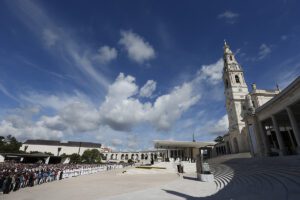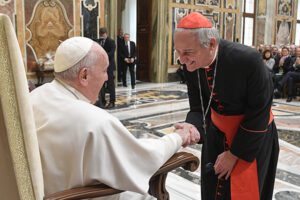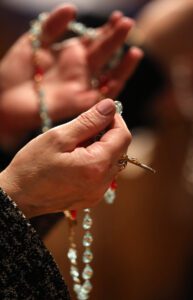(OSV News) – Ahead of the U.S. bishops’ June meeting, pastoral experts told OSV News they are looking forward to progress on issues impacting health care, Hispanic Catholics and persons with disabilities.
The U.S. Conference of Catholic Bishops (USCCB) will hold its spring plenary assembly in Orlando, Florida, June 14-16. As USCCB president, Archbishop Timothy P. Broglio of the U.S. Archdiocese for the Military Services, will address the bishops as well as oversee the proceedings. Archbishop Christophe Pierre, papal nuncio to the U.S., also will address the bishops. The public sessions June 15-16 will be livestreamed on the USCCB website at www.usccb.org.
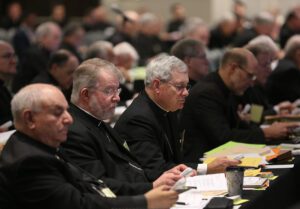
Amid prayer and dialogue sessions, the bishops will survey a number of topics, including the the bishops’ three-year National Eucharistic Revival, currently underway, and preparations for two major events: the 2024 National Eucharistic Congress in Indianapolis, which is the culminating event of the revival, and World Youth Day with Pope Francis, which will take place Aug. 1-6 in Lisbon, Portugal.
Although the plenary agenda has not been finalized, the bishops also are expected to discuss a plan for ongoing priestly formation, priorities for the USCCB’s 2025-2028 strategic plan, and translations of texts for the Liturgy of the Hours, and provide consultation on the canonization causes for the “Shreveport Martyrs,” five priests who heroically ministered to victims of an 1873 yellow fever epidemic in Shreveport, Louisiana.
In addition, the bishops will likely discuss revising a portion of their “Ethical and Religious Directives (ERDs) for Catholic Health Care Services” — specifically part three, which covers the relationship between medical professionals and patients.
The topic is both “critical and timely,” Dr. Timothy Millea, a retired spine surgeon and chair of the Catholic Medical Association’s Health Care Policy Committee, told OSV News.
“The relationship between the clinician and the patient has been increasingly under attack on so many levels,” said Millea.
Conscience rights for Catholic medical professionals are of particular concern, especially when clinicians are asked to perform procedures that violate their religious beliefs, he said.
Millea said the ERDs would benefit from an “(expansion) of the discussion on respect for the conscience and religious beliefs” of both clinicians and patients.
“We can accept that they’re asking us something we cannot do, and they … should not expect us to do that — nor should we be intimidated, threatened, or punished by our employer or the government,” said Millea.
Charleen Katra, executive director of the National Catholic Partnership on Disability in Washington, told OSV News that she will be on hand at the June meeting for talks on a new pastoral statement addressing persons with disabilities in the life of the church.
Since the bishops’ first such statement was published in 1978, there has been “a rise in autism and in mental illness diagnoses,” as well as “a broader understanding of disability and the many facets of (related) needs,” said Katra.
Language around disability also has shifted over the past four decades, highlighting “the person before any diagnosis or descriptor” and providing “more respectful, accurate communication that honors the dignity of the person,” she said.
Katra said an updated statement should contain greater “emphasis on the giftedness and vocations of persons with disabilities in the church, and the blessings that faith communities received from their active engagement.”
Focusing on “spiritual themes of hope and joy” in pastoral ministry to persons with disabilities can “help remove stigmas” and “a stance of pity,” Katra said.
Also likely on the June agenda will be discussion of the National Pastoral Plan for Hispanic/Latino Ministry, developed from the September 2018 Fifth National Encuentro of Hispanic Ministry, “a major exercise of consultation in a spirit of synodality,” said Hosffman Ospino, associate professor and chair of religious education and pastoral ministry at Boston College’s School of Theology and Ministry.
Coming some 36 years after the bishops’ first such document in 1987, the plan “will likely emphasize areas of pastoral action in the context of Catholic Hispanic ministry as identified by pastoral leaders and researchers during the last decades” and should be seen as “an affirmation” of that work, Ospino told OSV News.
In the intervening years, the number of Hispanic Catholics has dramatically increased, accelerating the need to prioritize “the accompaniment of young Hispanic Catholics, supporting Hispanic families and forming Hispanic pastoral leaders,” he said.

